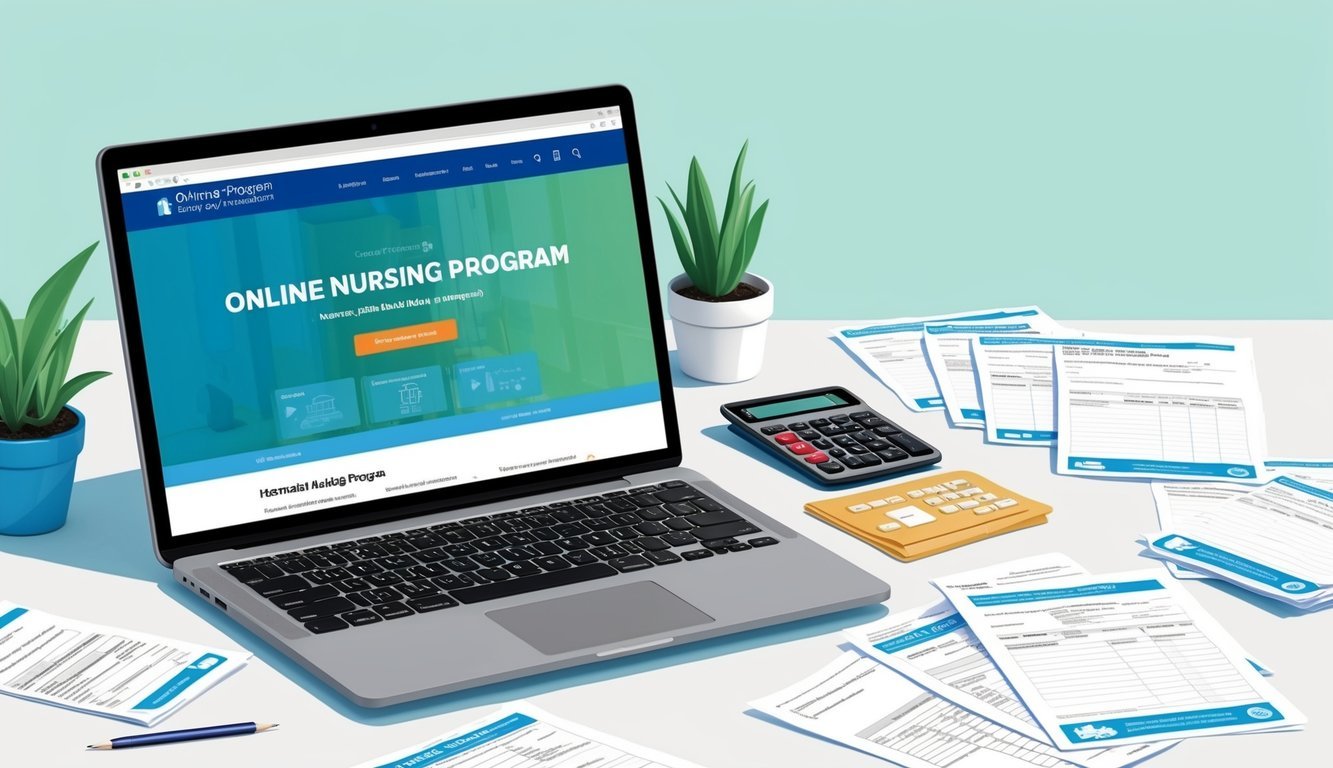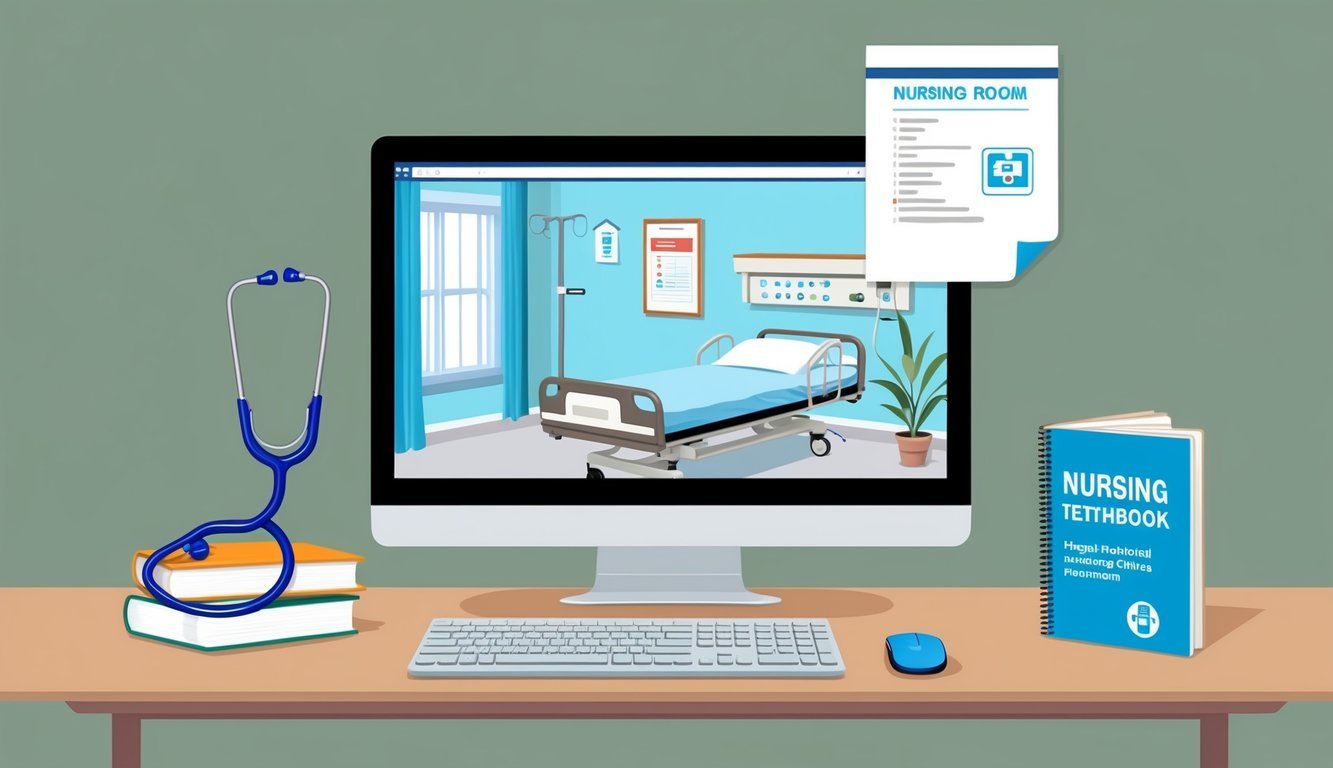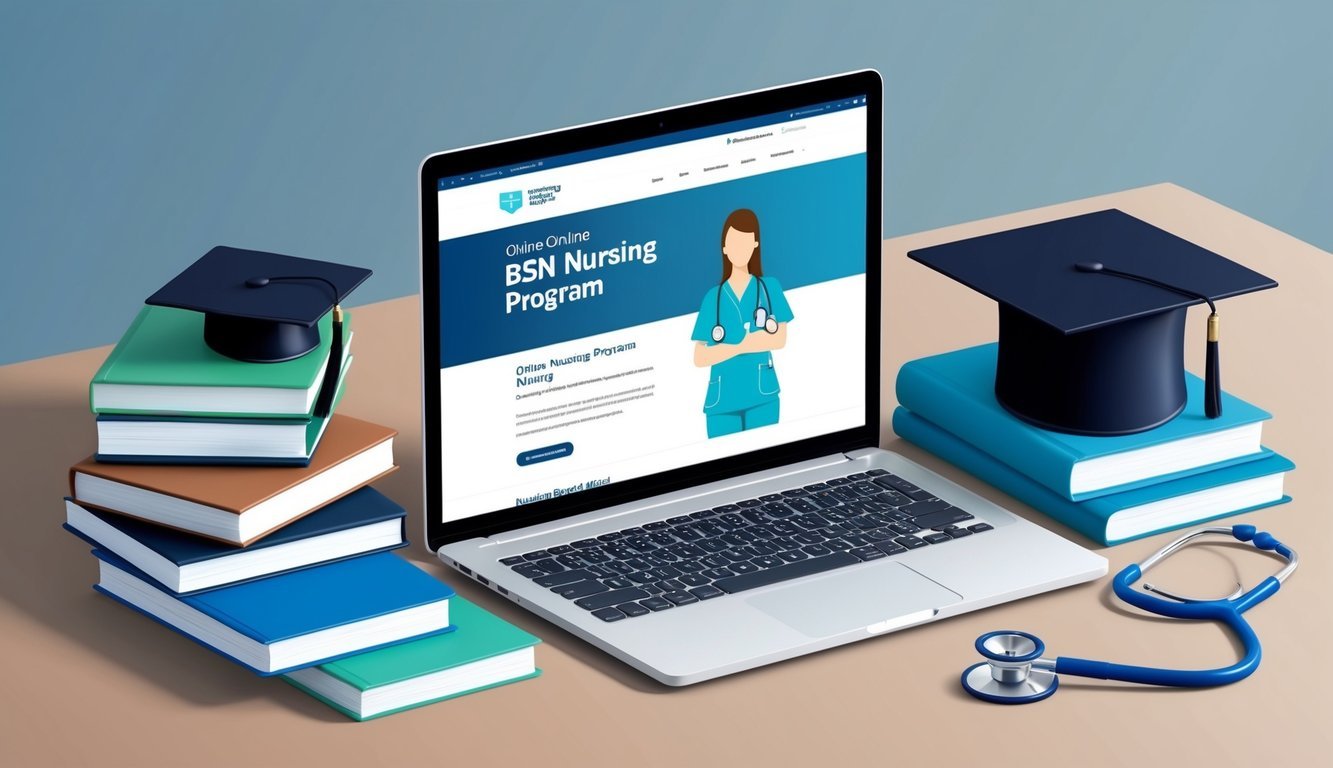Exploring online BSN nursing programs may be an excellent choice if you are considering advancing your nursing career.
These programs offer the flexibility to study at your own pace while gaining the necessary skills and knowledge to excel in the healthcare field. Online Bachelor of Science in Nursing (BSN) programs empower you to enhance your qualifications, leading to better job prospects and higher earning potential.
With various formats available, such as asynchronous courses and virtual clinical experiences, online BSN programs cater to your busy lifestyle.
You can choose a program that fits your schedule and allows you to balance work, family, and education effectively.
Whether you are an RN looking to upgrade your qualifications or someone transitioning into nursing, these online options provide an accessible pathway to achieving your goals.
In addition to flexibility, many online BSN nursing programs come with added benefits, such as a comprehensive curriculum and enhanced career opportunities.
Graduates often find that employers are increasingly seeking nurses with a BSN, resulting in improved patient outcomes and job security.
By pursuing an online BSN, you position yourself for a rewarding career in nursing.
Explore resources that rank the top online BSN programs to find the best fit for your aspirations.
Exploring BSN Online Programs
Online Bachelor of Science in Nursing (BSN) programs are key for advancing your nursing career.
They offer flexible pathways, including RN-to-BSN options, accommodating your busy schedule while enhancing your education.
Understanding BSN and RN-to-BSN Pathways
A Bachelor of Science in Nursing equips you with advanced knowledge and skills necessary for nursing practice.
It covers essential topics such as health assessment, pathophysiology, and leadership.
RN-to-BSN programs specifically target registered nurses who already hold an associate degree or diploma.
This pathway allows you to build on your existing knowledge and earn your bachelor’s degree in a more flexible format.
Many programs, like the one offered by Indiana University, are entirely online, letting you balance work and studies effectively.
You can expect to study core nursing concepts while integrating critical thinking and research skills into your practice.
Benefits of Online Nursing Education
Online nursing education provides numerous advantages.
Flexibility is a primary benefit, allowing you to manage coursework around your professional and personal commitments.
Here are some key benefits:
| Benefit | Description |
|---|---|
| Increased Earning Potential | Nurses with a BSN often earn more than those with an ADN. |
| Better Job Opportunities | Many employers prefer or require a BSN for advanced positions. |
| Improved Patient Outcomes | BSN programs emphasize holistic care and evidence-based practices. |
Choosing an online nursing degree helps you develop leadership skills and enhances job readiness, significantly broadening your career prospects.
Access programs like Baylor University’s Accelerated BSN to fast-track your nursing career.
Admission Requirements and Application Process
Understanding the admission requirements and application process is crucial for aspiring students in online BSN nursing programs.
This section details what you need to qualify and apply effectively.
Prerequisites and Transfer Credits
Before applying, ensure that you meet the prerequisites for enrollment.
Common requirements typically include:
- A high school diploma or equivalent.
- Completion of prerequisite coursework, such as anatomy, physiology, and microbiology.
For those with prior nursing education, transfer credits can play a significant role.
Schools like Purdue Global allow you to transfer up to 90 credits from previous nursing programs, streamlining your path to obtaining a Bachelor of Science in Nursing.
Check with your target schools about their specific policies on transfer credits to maximize your earned credits.
Application Materials and Deadlines
Your application will usually require several key documents.
Common materials include:
- Official transcripts from previous educational institutions.
- Letters of recommendation from healthcare professionals or educators.
- A personal statement outlining your goals and motivations for pursuing nursing.
Many programs have specific deadlines, so it’s essential to stay organized.
For example, Chamberlain offers a waived application fee until December 31, 2024.
Ensure you verify each program’s timeline and requirements early to avoid missed opportunities.
Staying ahead in the application process can significantly impact your chances of acceptance into your desired program.
Curriculum and Coursework
The curriculum for online BSN nursing programs incorporates a mix of core nursing courses, general education, and research methodologies.
This combination ensures you gain the essential competencies required for advanced nursing practice alongside critical thinking and clinical skills.
Core Nursing Courses and Specializations
Core nursing courses form the foundation of your education.
These typically include:
- Fundamentals of Nursing
- Pharmacology in Nursing
- Adult Health Nursing
- Pediatric Nursing
- Mental Health Nursing
Many programs also offer specializations such as Emergency Nursing, Geriatric Nursing, or Nursing Leadership.
Completing these courses equips you with the knowledge to address diverse patient needs effectively.
Programs often include a clinical component, providing hands-on experience in real healthcare settings, allowing you to apply your skills in practical situations.
Incorporating Research and Evidence-Based Practice
Research and evidence-based practice are pivotal in modern nursing.
Online BSN programs emphasize the importance of utilizing research to inform clinical decisions.
You will engage in coursework that covers:
- Research Methodologies
- Data Analysis
- Application of Evidence-Based Guidelines
Through these courses, you learn to assess and apply current research findings to improve patient outcomes.
This training enhances your ability to critically evaluate practices and implement changes that align with best practices in healthcare.
Integration of General Education
General education courses supplement your nursing curriculum by enhancing your analytical and communication skills.
These may include subjects such as:
- Psychology
- Sociology
- Nutrition
- Ethics
These courses help you understand the broader context of patient care, improving your ability to interact with patients from diverse backgrounds.
They are designed to develop essential soft skills, which are crucial for effective communication and teamwork in a clinical environment.
Completing general education requirements ensures a well-rounded education that supports your nursing career.
Tuition and Financial Aid

Navigating the costs associated with online BSN programs is crucial for prospective students.
Understanding tuition rates, financial aid options, and budgeting tools will help you manage your educational expenses efficiently.
Understanding Tuition Rates and Fees
Tuition rates for online BSN programs can vary significantly based on the institution and its location.
Typically, you might encounter rates between $300 to $600 per credit hour.
Additional Fees may include:
- Application Fees: Ranging from $50 to $100.
- Technology Fees: Often $100 to $200 per semester.
- Clinical Fees: These can vary widely depending on your clinical placement.
It’s important to check each school’s website for the most accurate and up-to-date information.
Exploring Financial Aid and Scholarships
Numerous financial aid options can alleviate your tuition burden.
Start by completing the FAFSA to determine your eligibility for federal aid.
Many schools, like Duquesne University, offer additional options, such as grants and loans.
Scholarships specifically for nursing students can also provide significant help.
Some resources include:
- Nursing Organizations: Many offer scholarships based on merit or need.
- School-Specific Scholarships: Check with your desired institution for available awards.
By pursuing these avenues, you can make your educational journey more affordable.
Utilizing Tuition Calculators and Budgeting Tools
Many online BSN programs feature tuition calculators on their sites to help you estimate overall costs based on your credit hour needs.
This tool can aid in planning your financial commitment.
Along with calculators, consider using budgeting tools to manage your finances:
- Budgeting Apps: Tools like Mint or YNAB (You Need a Budget) help track your expenses.
- Savings Plans: Establish a savings plan for tuition, supplies, and miscellaneous fees.
Using these resources will help you create a solid financial plan for your nursing education.
For more detailed assistance, explore additional tools available on educational websites, such as EduMed and BestColleges.
Clinical Experience and Skills Development

Clinical experience is essential in online BSN nursing programs as it bridges theoretical knowledge with practical application.
You will engage in clinical rotations and simulations that enhance your nursing skills, patient care, and critical thinking necessary for effective nursing practice.
Clinical Rotations and Virtual Simulations
Clinical rotations are structured periods where you gain hands-on experience in various healthcare settings.
These rotations allow you to apply your knowledge in real-world situations, enhancing your competency in patient care.
In addition to traditional rotations, many programs incorporate virtual simulations.
These simulations replicate clinical scenarios, enabling you to practice critical nursing skills in a risk-free environment.
This combination ensures you can adapt to the demands of patient care while developing your clinical skills effectively.
Building Patient Care and Critical Thinking Skills
Patient care is at the heart of nursing, and your training will focus on developing skills to assess and respond to patient needs.
Through interactions with patients during clinical rotations, you will learn to perform assessments, prioritize care, and implement treatment plans.
Moreover, critical thinking is crucial for problem-solving in nursing.
Courses and simulations will challenge you to think quickly and make informed decisions.
Engaging in case studies and scenarios during your training will foster analytical abilities, ensuring that you can provide high-quality care in varied situations.
These experiences will prepare you for the complexities of nursing, equipping you with the necessary tools to excel in your career.
Career Advancement and Continuing Education

Pursuing an online BSN nursing program opens up numerous avenues for career advancement and continuing education.
You can enhance your leadership skills and explore options for advanced degrees, providing a pathway to higher roles in nursing.
Opportunities in Nursing Leadership and Administration
As you advance in your nursing career, opportunities in leadership and administration become increasingly accessible.
You can move into roles such as Nurse Manager, Clinical Director, or Chief Nursing Officer.
These positions often require strong organizational and communication skills, along with a thorough understanding of healthcare policies.
Many employers now prefer candidates with a Bachelor of Science in Nursing (BSN) for leadership roles.
This degree sets the groundwork for effective decision-making and team management.
Programs that focus on leadership in nursing can assist you in developing these essential skills.
Roadmap to Advanced Degrees in Nursing
Pursuing further education, such as a Master of Science in Nursing (MSN), can significantly bolster your career prospects.
With an MSN, you can become a Nurse Practitioner (NP) or specialize in areas like healthcare administration, education, or clinical research.
A step-by-step roadmap for pursuing an advanced degree typically includes:
- Complete Your BSN: You need this to pursue an MSN.
- Gain Clinical Experience: Real-world experience strengthens your application.
- Choose a Specialization: Decide on your area of focus, whether it’s clinical practice or leadership.
- Enroll in an MSN Program: Select a program that fits your career goals and schedule.
- Pursue Certification: After graduation, obtain necessary certifications to practice in your chosen field.
Exploring these paths can deepen your expertise and enhance your professional standing.

